七年级英语下册第二单元知识点归纳Unit2单元归纳复习过程
人教版七年级英语下册Unit2单元总复习课说课讲解ppt课件
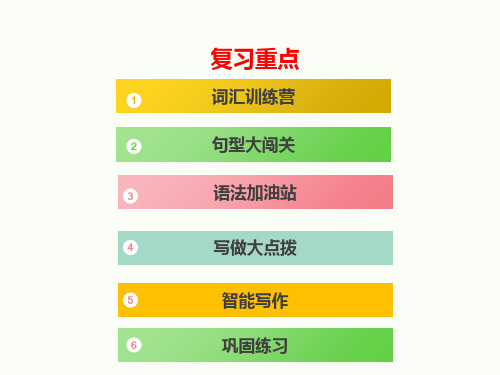
five to nine 8点55分
3
a quarter to four 3点45分;half past four 4点半
语法加油站
本单元学的语法,你还记得多少?
二、When, what time的区别及用法
1. When 和 what time 都是对时间提问的疑问代词,用what time 提问的句子一般可用when代替,反之则不一定。
3. Can you think what his job is? 这里what his job is表示“他的工作是什么 ”,其中,what
his job is 作think的宾语。 如:I don’t know what you say.我不懂你说的话。
4. What time is it?几点了? 对时间提问,用what time ,意为“几点”,它的同义句为: What’s the time? 在回答这个句子时,要用It’s +钟点。
5. —Do you often read the English newspaper?
—Yes, I usually read it for ____ before supper.
• half an hour
B. half a hour
C. half hour
D. an hour half
语法加油站
—Half past four.
A. What B. Why
C. When D. Where
5. Mike is a good boy. He _______ go home on time (准时).
• sometimes B. usually C. always D. never
七年级下册英语unit-12单元全册知识点归纳与复习总结说课讲解
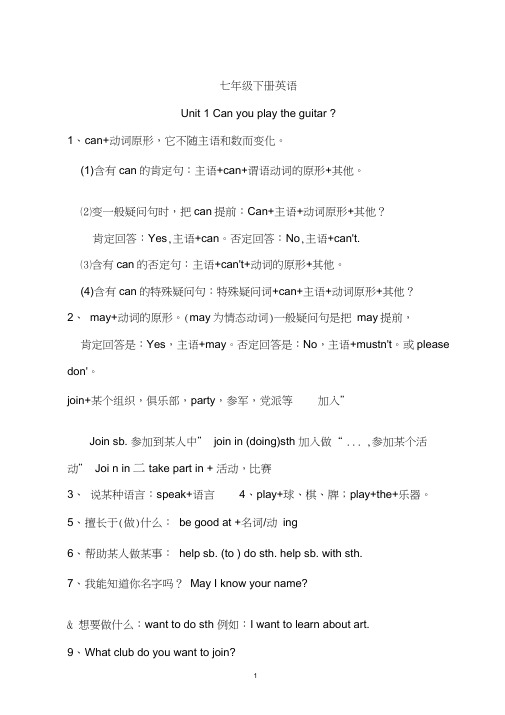
七年级下册英语Unit 1 Can you play the guitar ?1、c an+动词原形,它不随主语和数而变化。
(1)含有can的肯定句:主语+can+谓语动词的原形+其他。
⑵变一般疑问句时,把can提前:Can+主语+动词原形+其他?肯定回答:Yes,主语+can。
否定回答:No,主语+can't.⑶含有can的否定句:主语+can't+动词的原形+其他。
(4)含有can的特殊疑问句:特殊疑问词+can+主语+动词原形+其他?2、may+动词的原形。
(may为情态动词)一般疑问句是把may提前,肯定回答是:Yes,主语+may。
否定回答是:No,主语+mustn't。
或please don'。
join+某个组织,俱乐部,party,参军,党派等加入”Join sb. 参加到某人中” join in (doing)sth 加入做“... ,参加某个活动” Joi n in二 take part in + 活动,比赛3、说某种语言:speak+语言4、play+球、棋、牌;play+the+乐器。
5、擅长于(做)什么:be good at +名词/动ing6、帮助某人做某事:help sb. (to ) do sth. help sb. with sth.7、我能知道你名字吗?May I know your name?& 想要做什么:want to do sth 例如:I want to learn about art.9、W hat club do you want to join?I want to join the chess club and the basketball club.10、What club does Tom want to join? He wants to join the swimming club .11、He can't play the violin or the piano. Can you help kids with swimming?12、Why do you want to join the English club? Because I want to learn English well.Unit 2 What time do you go to school ?1、what time和when引导的特殊疑问句。
Unit2知识清单++默写版+2023-2024学年人教版七年级英语下册+

人教版七年级下Unit 2 What time do you go to school?基础知识梳理Section A重点单词1.__ ___ v.穿衣服n.连衣裙2. v.刷;刷净n.刷子3. n.&v.淋浴n.淋浴器(间)4. num.四十5. interj.(表示惊奇或敬佩)哇;呀6. adv.& adj.早(的)7. num. 五十8. n.工作;职业9. v. &n.工作10. n.电(视)台;车站11. adv. 表示整点……点钟12. n.晚上;夜晚13. v.&n.锻炼;练习14. adj.最好的adv.最好地;最15. n.组;群16. adv.向上17. n.牙齿(单)→(复数)18. adv.通常地;一般地19. adv.从不;绝不→(反义词) adv.总是20. adj.奇怪的;潜稽好笑的→n.乐趣;快乐重点短语1.起床;站起2.穿上衣服3.刷牙4.洗淋浴5.广播电台6.广播节目7.在晚上8.去上班去上学9.上班迟到10. (在)周末11.在上学日重点句型1.2.3.4.5. ——6.7.8.9. 你通常什么时候洗淋浴?我通常六点四十分洗淋浴。
斯科特有一份有趣的工作。
那个时间吃早饭真有意思哟!“里克什么时候吃早饭?”“他七点钟吃早饭。
”斯科特什么时候去上班?你的广播节目在几点?从夜里12点整到早上6点整。
我上班从不迟到。
Section B重点单词1. 一半;半数pron,n._________2. 一刻钟;四分之一n._________ 3.跑;奔v._________4.打扫;弄干净v.干净的adj._________ 5.或者conj.也adv._________6.大量;许多pron._________7.品尝v.味道;滋味n._________ 8.晚于prep.过去的adj._________ 9.家庭作业n._________10.行走;步行n.&v._________ 11.很快地adv._________12.生活;生命n._________13.有时adv._________★写出下列单词变形_________1.half-(复数)_________2.quickly(副词)-(形容词)_______ 3.life-(复数)_________4.one-(序数词)_________5. quarter-_(复数)_________ 6.healthy-______(反义词)-(名词)_______7.run-(现在分词)________te-(反义词)_________重点短语★根据汉语提示默写出下列短语1.回家__________________________ 2.做作业__________________________ 3.吃晚饭__________________________ 4.上床睡觉_________________________ 5.做运动_________________________ 6.一个健康的生活__________________ 7.散步;走一走____________________ 8.从学校回到家____________________ 9.去鲍勃家____________________ 10.打扫某人的房间__________________ 11.半个小时____________________12.到家____________________13.大量;许多____________________ 14.对...有好处____________________ 15.尝起来味道好____________________ 16.在下午三点一刻__________________ 17.要么...要么...;或者...或者...____________________18.在晚上差一刻七点_________________ 19.在早晨六点半__________________重点句子★根据汉语提示默写出下列句子1.在晚上,我要么看电视要么玩电脑游戏。
人教版初一七年级英语(下)第二单元Unit2知识点+语法整合
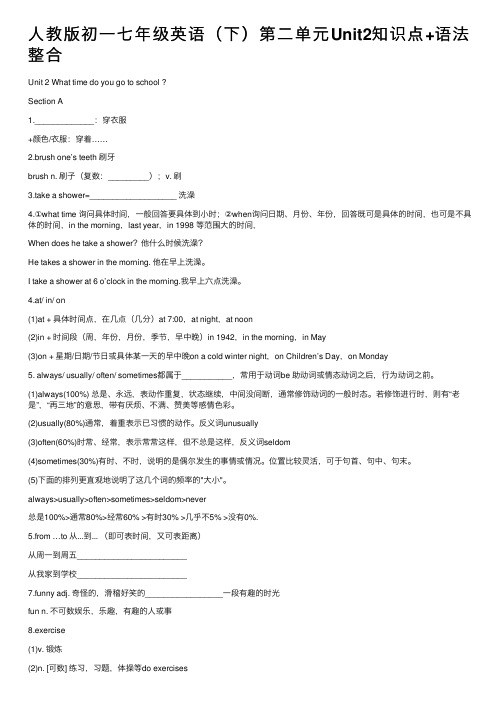
⼈教版初⼀七年级英语(下)第⼆单元Unit2知识点+语法整合Unit 2 What time do you go to school ?Section A1._____________:穿⾐服+颜⾊/⾐服:穿着……2.brush one’s teeth 刷⽛brush n. 刷⼦(复数:_________);v. 刷3.take a shower=___________________ 洗澡4.①what time 询问具体时间,⼀般回答要具体到⼩时;②when询问⽇期、⽉份、年份,回答既可是具体的时间,也可是不具体的时间,in the morning,last year,in 1998 等范围⼤的时间,When does he take a shower?他什么时候洗澡?He takes a shower in the morning. 他在早上洗澡。
I take a shower at 6 o’clock in the morning.我早上六点洗澡。
4.at/ in/ on(1)at + 具体时间点,在⼏点(⼏分)at 7:00,at night,at noon(2)in + 时间段(周,年份,⽉份,季节,早中晚)in 1942,in the morning,in May(3)on + 星期/⽇期/节⽇或具体某⼀天的早中晚on a cold winter night,on Children’s Day,on Monday5. always/ usually/ often/ sometimes都属于___________,常⽤于动词be 助动词或情态动词之后,⾏为动词之前。
(1)always(100%) 总是、永远,表动作重复,状态继续,中间没间断,通常修饰动词的⼀般时态。
若修饰进⾏时,则有“⽼是”,“再三地”的意思,带有厌烦、不满、赞美等感情⾊彩。
(2)usually(80%)通常,着重表⽰已习惯的动作。
初中英语 人教版 七年级下册 unit2单元知识点精讲
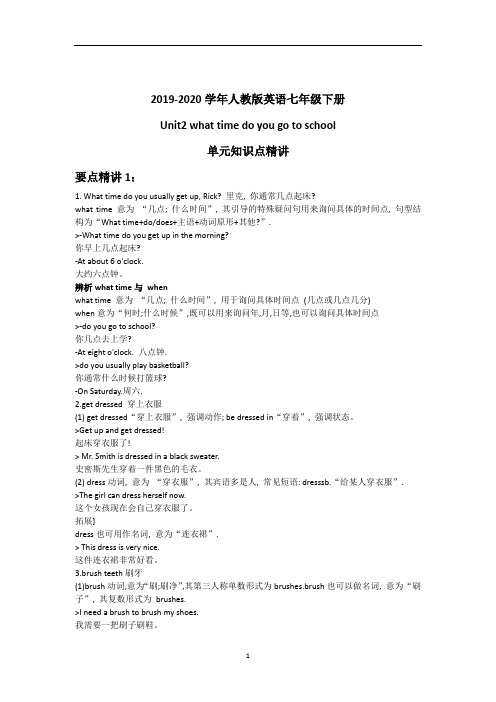
2019-2020学年人教版英语七年级下册Unit2 what time do you go to school单元知识点精讲要点精讲1:1. What time do you usually get up, Rick? 里克, 你通常几点起床?what time 意为“几点; 什么时间”, 其引导的特殊疑问句用来询问具体的时间点, 句型结构为“What time+do/does+主语+动词原形+其他?”.>-What time do you get up in the morning?你早上几点起床?-At about 6 o'clock.大约六点钟。
辨析what time与whenwhat time 意为“几点; 什么时间”, 用于询问具体时间点(几点或几点几分)when意为“何时;什么时候”,既可以用来询问年,月,日等,也可以询问具体时间点>-do you go to school?你几点去上学?-At eight o'clock. 八点钟.>do you usually play basketball?你通常什么时候打篮球?-On Saturday.周六.2.get dressed 穿上衣服(1) get dressed“穿上衣服”, 强调动作; be dressed in“穿着”, 强调状态。
>Get up and get dressed!起床穿衣服了!> Mr. Smith is dressed in a black sweater.史密斯先生穿着一件黑色的毛衣。
(2) dress动词, 意为“穿衣服”, 其宾语多是人, 常见短语: dresssb.“给某人穿衣服”.>The girl can dress herself now.这个女孩现在会自己穿衣服了。
拓展]dress也可用作名词, 意为“连衣裙”.> This dress is very nice.这件连衣裙非常好看。
Unit2知识点讲解人教版英语七年级下册

1.英语钟点时刻的表达在英语中,钟点时刻的表达除了用阿拉伯数字(如8:10,12:45)外,还可以用以下几种表达方式。
◆当时间是整点时,可用“钟点数+o'clock”来表达,其中o'clock可以省略。
如:6:00 → six (o'clock) 11:00 → eleven (o'clock)◆当时间不是整点时,表达方式有以下两种:1. 钟点数+分钟数。
如:9:08 → nine eight 14:40 → fourteen forty2. 分钟数+ past / to +钟点数1) 当分钟数小于30时,用“分钟数+ past +钟点数”表示“几点过几分”。
如:8:09 → nine past eight7:25 → twentyfive past seven2) 当分钟数大于30时,用“(60-分钟数) + to +下一个钟点数”表示“差几分到几点”。
如:11:40 → twenty to twelve 2:58 → two to three注意:在分钟数中,15分钟还可以用a quarter表示,30分钟还可以用half来表示。
如:11:15 → a quarter past eleven8:45 → a quarter to nine13:30 → half past thirteen◆ A.M.(a.m.)和P.M.(p.m.)在12小时制中,我们可以用A.M.(a.m.)和P.M.(p.m.)来区分上、下半天。
A.M.(a.m.)意为“午前、上午”; P.M.(p.m.)意为“午后、下午”。
如:早上六点半→ 6:30 a.m. / half past six in the morning中午十二点→ 12:00 p.m. / 12 o'clock in the daytime午夜十二点→ 12:00 a.m. / 12 o'clock at night / at midnight【运用】用两种方式写出下列时间的英语表达1. 2. 3.___________________ 或___________________ ___________________或______________________________________或___________________参考答案1. four thirty; half past four2. eleven five; five past eleven3. nine fifteen; a quarter past nine2. what time & when 引导的特殊疑问句what time和when均可对时间状语进行提问,用来询问什么时间。
译林版牛津英语七年级下册全册Unit2单元知识点及语法归纳
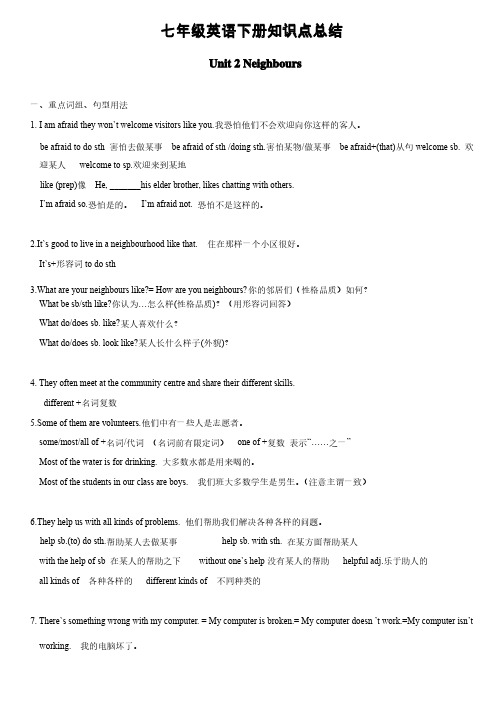
七年级英语下册知识点总结Unit 2 Neighbours一、重点词组、句型用法一、重点词组、句型用法1. I am afraid they won`t welcome visitors like you.我恐怕他们不会欢迎向你这样的客人。
我恐怕他们不会欢迎向你这样的客人。
be afraid to do sth 害怕去做某事害怕去做某事 be afraid of sth /doing sth.害怕某物/做某事做某事be afraid+(that)从句welcome sb. 欢迎某人迎某人 welcome to sp.欢迎来到某地欢迎来到某地like (prep)像He, _______his elder brother, likes chatting with others. I’m afraid so.恐怕是的。
恐怕是的。
I’m afraid not. 恐怕不是这样的。
恐怕不是这样的。
2.It`s good to live in a neighbourhood like that. 住在那样一个小区很好。
住在那样一个小区很好。
It`s+形容词to do sth3.What are your neighbours like?= How are you neighbours?你的邻居们(性格品质)如何?你的邻居们(性格品质)如何?What be sb/sth like?你认为…怎么样(性格品质)?(用形容词回答)?(用形容词回答)What do/does sb. like?某人喜欢什么?某人喜欢什么?What do/does sb. look like?某人长什么样子(外貌)?4. They often meet at the community centre and share their different skills.different +名词复数名词复数5.Some of them are volunteers.他们中有一些人是志愿者。
七年级英语下册第二单元知识点归纳Unit2单元归纳

Unit 2 What time do you go to school 单元归纳短语归纳1.what time 几点2.go to school 去上学3.get up 起床4.take a shower 洗淋浴5.brush teeth 刷牙6.get to 到达7.do homework 做家庭作业8.go to work 去上班9.go home 回家10.eat breakfast 吃早饭11.get dressed 穿上衣服12.get home 到家13.either…or…要么…要么…14.go to bed 上床睡觉15.in the morning/ afternoon/ evening在上午/下午/晚上16.take a walk 散步17.lots of 许多,大量18.radio station 广播电台19.at night 在晚上20.be late for 迟到用法集萃1.at + 具体时间点在几点(几分)2.eat breakfast/ lunch/dinner吃早饭/午饭/晚饭3.take a(n) +名词从事(……)活动4.half past +基数词……点半5. a quarter to +基数词差一刻到……点6.from …to …从……到……7.need to do sth 需要做某事典句必背1. What time do you usually get upI usually get up at six thirty.2. That’s a funny time for breakfast.3. When do students uasually eat dinnerThey usually eat dinner at a quarter to seven in the evening.4. In the evening, I either watch TV or play computer games.5. At twelve,she eats lots of fruit and vegetables for lunch..6. She knows it’s not good for her, but it tastes good.7. Here are your clothes.佳作赏析主题:谈论日常作息习惯写作思路:按照时间顺序记叙一个人的日常作息习惯,必须注意时间的先后顺序,以及时间的表达方式,可以适当运用一些表示频率的副词。
七年级英语人教版下册Unit2重点知识点归纳
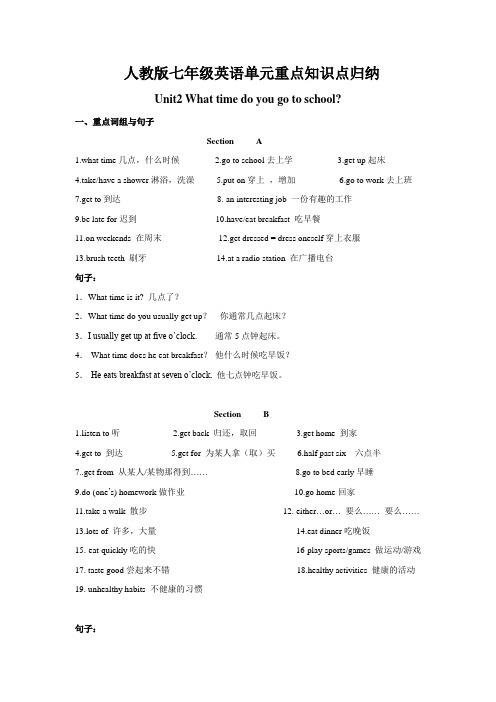
人教版七年级英语单元重点知识点归纳Unit2 What time do you go to school?一、重点词组与句子Section A1.what time几点,什么时候2.go to school去上学3.get up起床4.take/have a shower淋浴,洗澡5.put on穿上,增加6.go to work去上班7.get to到达8. an interesting job 一份有趣的工作9.be late for迟到10.have/eat breakfast 吃早餐11.on weekends 在周末12.get dressed = dress oneself穿上衣服13.brush teeth 刷牙14.at a radio station 在广播电台句子:1.What time is it? 几点了?2.What time do you usually get up?你通常几点起床?3.I usually get up at five o’clock. 通常5点钟起床。
4.-What time does he eat breakfast?他什么时候吃早饭?5.-He eats breakfast at seven o’clock. 他七点钟吃早饭。
Section B1.listen to听2.get back 归还,取回3.get home 到家4.get to 到达5.get for 为某人拿(取)买6.half past six 六点半7..get from 从某人/某物那得到……8.go to bed early早睡9.do (one’s) homework做作业10.go home回家11.take a walk 散步12. either…or…要么……要么……13.lots of 许多,大量14.eat dinner吃晚饭15. eat quickly吃的快16 play sports/games 做运动/游戏17. taste good尝起来不错18.healthy activities 健康的活动19. unhealthy habits 不健康的习惯句子:1.When do students usually eat dinner?学生们通常什么时候吃晚餐?2.I don’t have much time for breakfast.我没有许多时间吃早餐。
人教版七年级下册英语Unit-2单元知识点复习
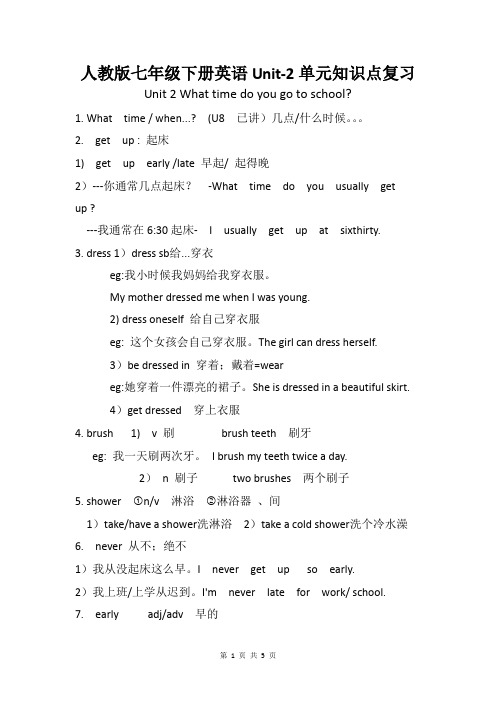
人教版七年级下册英语Unit-2单元知识点复习Unit 2 What time do you go to school?1. What time / when...? (U8 已讲)几点/什么时候。
2. get up : 起床1) get up early /late 早起/ 起得晚2)---你通常几点起床?-What time do you usually getup ?---我通常在6:30起床- I usually get up at sixthirty.3. dress 1)dress sb给...穿衣eg:我小时候我妈妈给我穿衣服。
My mother dressed me when I was young.2) dress oneself 给自己穿衣服eg: 这个女孩会自己穿衣服。
The girl can dress herself.3)be dressed in 穿着;戴着=weareg:她穿着一件漂亮的裙子。
She is dressed in a beautiful skirt.4)get dressed 穿上衣服4. brush 1) v 刷brush teeth 刷牙eg: 我一天刷两次牙。
I brush my teeth twice a day.2)n 刷子two brushes 两个刷子5. shower ①n/v 淋浴②淋浴器、间1)take/have a shower洗淋浴2)take a cold shower洗个冷水澡6. never 从不;绝不1)我从没起床这么早。
I never get up so early.2)我上班/上学从迟到。
I'm never late for work/ school.7. early adj/adv 早的1) catch the early bus赶早班车2) The early bird catch而是the worm.早起的鸟儿有虫吃。
人教版七年级英语下 Unit2 知识点语法归纳总结
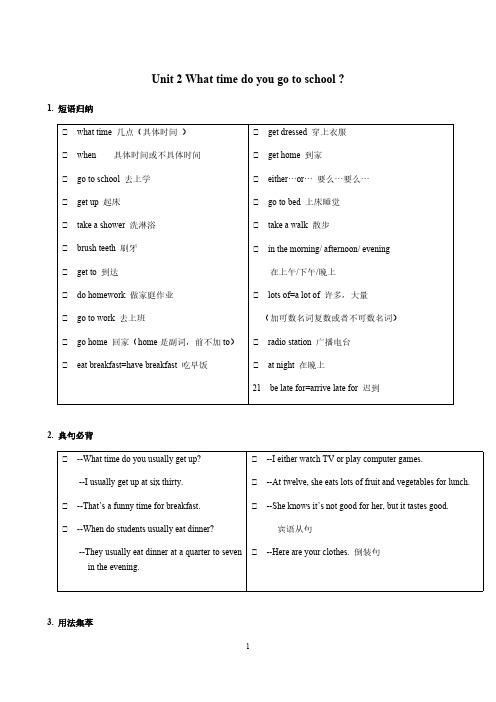
Unit 2 What time do you go to school ?1.短语归纳①what time 几点(具体时间)①when具体时间或不具体时间①go to school 去上学①get up 起床①take a shower 洗淋浴①brush teeth 刷牙①get to 到达①do homework 做家庭作业①go to work 去上班①go home 回家(home是副词,前不加to)①eat breakfast=have breakfast 吃早饭①get dressed 穿上衣服①get home 到家①either…or…要么…要么…①go to bed 上床睡觉①take a walk 散步①in the morning/ afternoon/ evening在上午/下午/晚上①lots of=a lot of 许多,大量(加可数名词复数或者不可数名词)①radio station 广播电台①at night 在晚上21 be late for=arrive late for 迟到2.典句必背①--What time do you usually get up?--I usually get up at six thirty.①--That’s a funny time for breakfast.①--When do students usually eat dinner?--They usually eat dinner at a quarter to sevenin the evening. ①--I either watch TV or play computer games.①--At twelve, she eats lots of fruit and vegetables for lunch.①--She knows it’s not good for her, but it tastes good.宾语从句①--Here are your clothes. 倒装句3.用法集萃(1)What time do you usually get up , Rick?①频度副词:表示动作频率的副词辨析:always, usually, often, sometimes, seldom, never频度频度副词含义举例always一直;总是The sun always rises in the east and sets in the west.太阳总是东升西落usually通常I usually ask my father for help. 我通常会向我爸爸求助often经常It often rains here in April. 这儿四月份常下雨sometimes有时;不时I sometimes wait for him at the school gate.我有时在学校大门口等他seldom/hardly/hardly/ever很少;几乎不I don’t like swimming, so I seldom go swimming.我不喜欢游泳,所以我很少去游泳频率由高到低never从不;从来没有I never tell lies. 我从不说谎①常见的get 短语get up 起床;站起get back 回来get on 上车get out 出去get off 下车get to 到达get dressed 穿上衣服get married 结婚get together 相聚;聚会get ready (for) (为...)做好准备(2)辨析 get dressed 与 be dressed in①get dressed 表示“穿”的动作①be dressed in 表示“穿”的状态①拓展:dress, put on, wear, be indress其后可跟表示人的名词或代词,意为“给...穿衣服”She can dress herself.她会自己穿衣服put on意为“穿上;戴上”,强调“穿、戴”的动作You’d better put on your coat.你最好穿上你的外套wear意为“穿着;戴着”,强调“穿、戴”的状态She is wearing a beautiful evening dress.她穿着一件漂亮的晚礼服be in其后可跟衣服或颜色类的词汇,也表示“穿、戴”的状态The girl in red is my sister.那个穿红色衣服的是我的妹妹(3)辨析:at, in,on→I usually get up at six thirty.at at和时间点搭配,还可以和noon,night等搭配at nine o’clock/at nightin in和年、月、季节搭配,还可以和morning,evening等搭配in July/in summer/in the morning on on和星期、日期搭配,还可以表示在具体某一天的上午、下午或晚上on Sunday/on June 1st(4)exercise的用法→ After that, I usually exercise at about ten twenty.那之后我通常在10点20分左右锻炼身体①作动词,意为“锻炼”,可作及物动词,也可作不及物动词例:How often do you exercise? 你多久锻炼一次?He exercises his body every day. 他每天锻炼身体。
北师大版七年级下册英语unit2知识点总结 语法点(含答案)

知识图谱Unit 2 On the Weekend知识精讲一、必背词汇violin n. 小提琴chore n. 家务活;琐事clean v. 打扫adj. 干净的,洁净的dust v. 擦去……的灰尘 n. 灰尘feed v. 给(人或动物)食物;喂养;饲养sweep v. 扫;清扫floor n. 地板;地面;楼层rubbish n. 垃圾;废弃物water v. 给……浇水n. 水busy adj. 忙的,杂乱的vt. 使忙于vi. 忙cup n. 杯子;一杯anything prop. 任何事物;任何东西worry v. 担心;担忧ring v. 响起铃声;给……打电话n. 戒指knock v. 撞;敲n. 敲击;敲门声candle n. 蜡烛wonderful adj. 精彩的;使人愉快的dish n. 碟;盘;餐具;一道菜nose n. 鼻子, 突出部分, 嗅觉v. 嗅communication n. 交流;交际tool n. 工具vt. 驾驶,用工具加工,印压图案于vi. 驾驶, 用工具加工instant adj. 立即的message n. 信息,消息text n. 文本;文章v. 发短信send v. 发送receive v. 接到;收到while n. 一会儿conj. 在……期间slow adj. 慢的adv. 慢慢地vt.& vi. 放慢,减速just adv. 只是;正好;刚才website n. 网站bank n. 银行;河岸museum n. 博物馆police n. 警察部门;警方station n. 站,所,局;火车站;电视台post n. 邮政;职位v. 邮寄;张贴;发布office n. 办公室,职务,事务train n. 火车underground n. 地铁way n. 路线;路;方法excuse v. 原谅n. 借口;理由cross v. 穿越,越过,横过street n. 大街;街道road n. 路,道路,公路corner n. 角;街角miss v. 错过;想念opposite prep. 与……相对adj. 对面的;across prep. 从一边到另一边;横过square n. 广场gym n. 体育馆;健身房二、重点词汇1. busy adjective /ˈbɪzi/If you are busy, you are working hard, or giving your attention to a particular thing.忙碌的;忙于……的;专注的1). Mum was busy in the kitchen.妈妈在厨房里忙活呢。
七年级英语下册第二单元知识点详细总结(译林版)

7B Unit2 知识点总结Comic strip1.I'm afraid they won't welcome visitors like you. 恐怕他们不会欢迎像你这样的客人。
(1)I'm afraid 译为“恐怕”,是一种口语表达习惯,通常不用he's afraid, she's afraid.例:I'm afraid it is going to rain tomorrow. 恐怕明天要下雨了。
补充:①be afraid of sth 害怕某物我害怕蛇②I'm afraid so. 我恐怕是这样的。
I‘m afraid not. 我恐怕不是这样的。
I think so. 我如此认为。
I don't think so. 我不这样认为。
③be afraid of doing sth④be afraid to do sth 表示“怕….. ”之意---Can I have dinner with you?我能与你共进晚餐吗?--- Sorry, I'm afraid not.这里的意思是:对不起,不能(2)visitor 派生词由visit演变职业cashier cleaner dancer driver engineer farmer manager officer painter playerreporter singer shopkeeper teacher waiterwaitress worker writer actress actordoctor dentist astronaut(宇航员)artist hostpilot policeman postman model cooknurse2.like介词:像look like/ be like动词:喜欢like doing sth3.Most of them have 14 floors.大多数楼有14层。
牛津译林版七年级英语下册Unit 2 Neighbours 重难点知识归纳总结
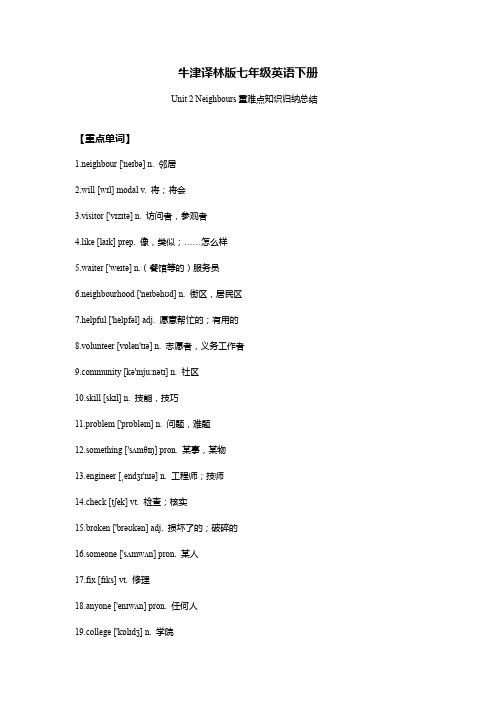
17.on the afternoon of 5 March在三月五号的下午
18.all the day整天
19.know a lot about styles and colours对风格和颜色很了解
20.be happy to give you some ideas很高兴给你一些主意
牛津译林版七年级英语下册
Unit 2 Neighbours重难点知识归纳总结
【重点单词】
1.neighbour ['neɪbə] n.邻居
2.will [wɪl] modal v.将;将会
3.visitor ['vɪzɪtə] n.访问者,参观者
4.like [laɪk] prep.像,类似;……怎么样
【重点句型】
1.I am afraid they won’t welcome visitors like you.
我恐怕他们不会欢迎像你这样的客人。
2.It’s good to live in a neighbourhood like that.
住在那样一个小区很好。
3.What are your neighbours like?
34.artist ['ɑːtɪst] n.艺术家
35.sound [saʊnd] linking v.听起来
36.sick [sɪk] adj.生病的;恶心的
37.notice ['nəʊtɪs] n.布告,通知
rmation [ˌɪnfΒιβλιοθήκη 'meɪʃən] n.信息
39.below [bɪ'ləʊ] adv.下面
5.waiter ['weɪtə] n.(餐馆等的)服务员
人教版七年级英语下册第二单元知识点归纳总结Unit-2
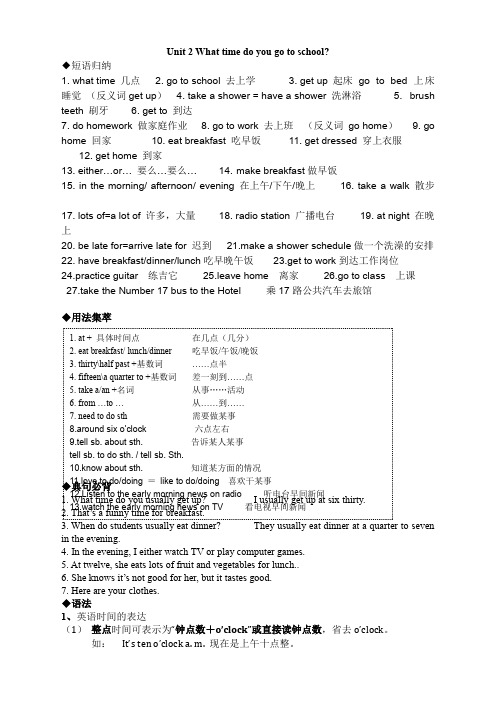
Unit 2 What time do you go to school?◆短语归纳1. what time 几点2. go to school 去上学3. get up 起床 go to bed 上床睡觉 (反义词get up )4. take a shower = have a shower 洗淋浴5. brush teeth 刷牙6. get to 到达7. do homework 做家庭作业 8. go to work 去上班 (反义词 go home ) 9. go home 回家 10. eat breakfast 吃早饭 11. get dressed 穿上衣服12. get home 到家13. either…or… 要么…要么… 14. make breakfast 做早饭15. in the morning/ afternoon/ evening 在上午/下午/晚上 16. take a walk 散步17. lots of=a lot of 许多,大量 18. radio station 广播电台 19. at night 在晚上20. be late for=arrive late for 迟到 21.make a shower schedule 做一个洗澡的安排22. have breakfast/dinner/lunch 吃早晚午饭 23.get to work 到达工作岗位24.practice guitar 练吉它 25.leave home 离家 26.go to class 上课27.take the Number 17 bus to the Hotel 乘17路公共汽车去旅馆◆用法集萃 ◆典句必背 1. What time do you usually get up? I usually get up at six thirty. 2. That’s a funny time for breakfast. in the evening.4. In the evening, I either watch TV or play computer games.5. At twelve, she eats lots of fruit and vegetables for lunch..6. She knows it’s not good for her, but it tastes good.7. Here are your clothes.◆语法1、英语时间的表达(1) 整点时间可表示为“钟点数+o’clock”或直接读钟点数,省去o’clock 。
初一下册英语第二单元知识点总结归纳

初一下册英语第二单元知识点总结归纳摘要:一、重点句型及回答1.询问喜好和习惯的句型:What do you like to do? / What habits do you have?2.描述他人喜好的句型:He/She likes to do sth./ He/She has the habit of doing sth.3.表达喜好的回答:I like / I don"t like4.表达习惯的回答:I have the habit of doing sth.二、疑问词和回答1.询问时间:What time do you ...?回答:I usually ...at .../ I often ...at ...2.询问地点:Where do you ...?回答:I ...at .../ I ...in ...三、日常用语和场景1.早上问候:Good morning!2.介绍:Hello, this is .../ Nice to meet you.3.感谢:Thank you / You"re welcome4.告别:Goodbye / See you later四、重点词汇1.学科:math / science / English / physical education2.日常活动:play sports / listen to music / read books / watch TV3.食物和饮料:hamburgers / hot dogs / pizza / juice / coffee正文:初一下册英语第二单元主要涵盖了日常交际用语、疑问词询问、表达喜好和习惯的句型以及日常场景对话等内容。
以下是对这些知识点的详细总结:一、重点句型及回答1.询问喜好和习惯的句型:What do you like to do? / What habits do you have?回答:I like playing sports./ I have the habit of reading books.2.描述他人喜好的句型:He/She likes to do sth./ He/She has the habit of doing sth.例如:My brother likes playing video games./ My sister has the habit of waking up early.3.表达喜好的回答:I like / I don"t like例如:I like pizza./ I don"t like coffee.4.表达习惯的回答:I have the habit of doing sth.例如:I have the habit of exercising every day.二、疑问词和回答1.询问时间:What time do you start school?回答:I start school at 7:30./ I usually start school at 7:30.2.询问地点:Where do you live?回答:I live in a apartment./ I live near the supermarket.三、日常用语和场景1.早上问候:Good morning, classmates!2.介绍:Hello, this is my new friend, Lisa./ Nice to meet you, Lisa.3.感谢:Thank you for helping me./ You"re welcome.4.告别:Goodbye, see you later! / See you tomorrow, classmates!四、重点词汇1.学科:math / science / English / physical education例如:My favorite subject is math./ She is good at English.2.日常活动:play sports / listen to music / read books / watch TV例如:I play soccer after school./ She likes to listen to music in her free time.3.食物和饮料:hamburgers / hot dogs / pizza / juice / coffee例如:My favorite food is pizza./ I drink coffee in the morning.通过学习初一下册英语第二单元的知识点,我们可以在日常生活中更好地与他人进行交流,了解彼此的喜好和习惯。
人教版七年级英语下册Unit 2 What time do you go to school知识点归纳总结

Unit 2 What time do you go to school?◆短语归纳1. what time 几点2. go to school 去上学3. get up 起床 go to bed 上床睡觉(反义词get up )4. take a shower = have a shower 洗淋浴5. brush teeth 刷牙6. get to 到达7. do homework 做家庭作业 8. go to work 去上班(反义词 go home )9. go home 回家 10. eat breakfast 吃早饭 11. get dressed 穿上衣服12. get home 到家13. either…or… 要么…要么… 14. make breakfast 做早饭15. in the morning/ afternoon/ evening 在上午/下午/晚上 16. take a walk 散步17. lots of=a lot of 许多,大量 18. radio station 广播电台 19. at night 在晚上20. be late for=arrive late for 迟到21.make a shower schedule 做一个洗澡的安排22. have breakfast/dinner/lunch 吃早晚午饭 23.get to work 到达工作岗位24.practice guitar 练吉它25.leave home 离家26.go to class 上课27.take the Number 17 bus to the Hotel 乘17路公共汽车去旅馆◆用法集萃 ◆典句必背 1. What time do you usually get up? I usually get up at six thirty. 2. That’s a funny time for breakfast. 3. When do students usually eat dinner? They usually eat dinner at a quarter to seven in the evening.4. In the evening, I either watch TV or play computer games.5. At twelve, she eats lots of fruit and vegetables for lunch..6. She knows it’s not good for her, but it tastes good.7. Here are your clothes.◆语法1. at + 具体时间点 在几点(几分)2. eat breakfast/ lunch/dinner 吃早饭/午饭/晚饭3. thirty\half past +基数词 ……点半4. fifteen\a quarter to +基数词 差一刻到……点5. take a/an +名词 从事……活动6. from …to … 从……到……7. need to do sth 需要做某事8.around six o’clock 六点左右9.tell sb. about sth. 告诉某人某事 tell sb. to do sth. / tell sb. Sth. 10.know about sth. 知道某方面的情况 11.love to do/doing = like to do/doing 喜欢干某事 12.Listen to the early morning news on radio 听电台早间新闻 13.watch the early morning news on TV 看电视早间新闻1、英语时间的表达(1)整点时间可表示为“钟点数+o’clock”或直接读钟点数,省去o’clock。
七年级英语下Unit 2 知识点归纳与复习人教新目标版

新目标七年级下Unit 2 知识点归纳与复习单元知识清单一、重点单词:1. libr r 图书馆2. rest rant 餐馆3. superm ket 超市4. str t 街道5. p k 公园6. c nt 中心7. br ge 桥8. n 在……附近9. acr 横过10. n xt 贴近11. betw n 在两者之间12. fr nt 前面13. t n 转弯14. l ft 左边15. r t 右边16. cl n 清洁的17. qu t 宁静的18. d ty 肮脏的19. h se 房子20. welc m 欢迎21. g den 花园22. enj 欣赏23. w k 散步24. thr 穿过25. begin 开始26. t 旅行27. v s t 参观28. pl ce 地方29. h gry 饥饿的30. a ive 到达31. w 路线32. t ke 乘, 坐33. t x 出租车34. airp t 飞机场35. p ss 通过36. h pe 希望二、必会短语1. post 邮局2. phone 投币式公用电话3. in of 在……前面4. on 在右边5. take 散步6. fun 玩得开心7. turn 向左转8. across 在……对面9. take 坐出租车10. have a 旅途愉快三、应知语法和句式:1. 表示在某地有某物用there be。
如:在这附近有一家银行。
a bank near here.2. There de 的一般问句是将be放到there的前面。
如:有一个超市吗?a supermarket?肯定回答是:Y es, .否定回答是:No, .3. 本课学习的两种问路方式:一种是:用Is there …? 如:在这附近有公用电话吗?a pay phone near here?另一种是:用Where is the …? 如:图书馆在哪?the library?4. welcome to …表示欢迎到某地。
七年级英语下册第二单元知识点详细总结(译林版)

7B Unit2 知识点总结Comic strip1.I'm afraid they won't welcome visitors like you. 恐怕他们不会欢迎像你这样的客人。
(1)I'm afraid 译为“恐怕”,是一种口语表达习惯,通常不用he's afraid, she's afraid.例:I'm afraid it is going to rain tomorrow. 恐怕明天要下雨了。
补充:①be afraid of sth 害怕某物我害怕蛇②I'm afraid so. 我恐怕是这样的。
I‘m afraid not. 我恐怕不是这样的。
I think so. 我如此认为。
I don't think so. 我不这样认为。
③be afraid of doing sth④be afraid to do sth 表示“怕….. ”之意---Can I have dinner with you?我能与你共进晚餐吗?--- Sorry, I'm afraid not.这里的意思是:对不起,不能(2)visitor 派生词由visit演变职业cashier cleaner dancer driver engineer farmer manager officer painter playerreporter singer shopkeeper teacher waiterwaitress worker writer actress actordoctor dentist astronaut(宇航员)artist hostpilot policeman postman model cooknurse2.like介词:像look like/ be like动词:喜欢like doing sth3.Most of them have 14 floors.大多数楼有14层。
- 1、下载文档前请自行甄别文档内容的完整性,平台不提供额外的编辑、内容补充、找答案等附加服务。
- 2、"仅部分预览"的文档,不可在线预览部分如存在完整性等问题,可反馈申请退款(可完整预览的文档不适用该条件!)。
- 3、如文档侵犯您的权益,请联系客服反馈,我们会尽快为您处理(人工客服工作时间:9:00-18:30)。
<<<<<<精品资料》》》》》Unit 2单元归纳短语归纳1.what time 几点2.go to school 去上学3.get up 起床4.take a shower 洗淋浴5.brush teeth 刷牙6.get to 到达7.do homework 做家庭作业8.go to work 去上班9.go home 回家10.eat breakfast 吃早饭11.get dressed 穿上衣服12.get home 到家13.either…or…要么…要么…14.go to bed 上床睡觉15.in the morning/ afternoon/ evening 在上午/下午/晚上16.take a walk 散步17.lots of 许多,大量18.radio station 广播电台19.at night 在晚上20.be late for 迟到用法集萃1.at + 具体时间点在几点(几分)2.eat breakfast/ lunch/dinner吃早饭/午饭/晚饭3.take a(n) +名词从事(……)活动4.half past +基数词……点半5. a quarter to +基数词差一刻到……点6.from …to …从……到……7.need to do sth 需要做某事佳作赏析主题:谈论日常作息习惯写作思路:按照时间顺序记叙一个人的日常作息习惯,必须注意时间的先后顺序,以及时间的表达方式,可以适当运用一些表示频率的副词。
例文:My School DayI am a student. I usually get up at seven, and I eat breakfast at seven thirty. Then I go to school at eight. School starts at eight thirty. I eat lunch at twelve. I go home at 17:00. I often eat dinner at 19:00 and then play the piano. I do my homework at 20:00. At 22:00, I go to bed.Unit2 单元测试题Grade________ Name ________Ⅰ.选择填空。
1. ―What's the time? ―_____half past nine. A. Its B. It's C. This is D. They're2. We go to ___ at six thirty in the morning. A. the school B. a school C. school D. schools3. —___ does your mother work? —In a school.A. What B. How C. Where D. When4. —What time is it? —It's ____eight o'clock. A. at B. on C. in D. around5. Do you want to listen to the _____ story?A. funnily B. funny C. funy D. funer6 What time does Jane ______ after school?A. do her homeworkB. does her homeworkC. do her homeworksD. does her homeworks7. I ___ at ten o'clock in the evening.A. have breakfastB. get upC. go to bedD. watch morning TV8.He eats ____ dinner at 7:30 in the evening. A. a B. an C. the D. /9. Please write and tell me ______ your morning. A. for B. to C. about D. of10. ____ Lucy and Lily go home at seven? A. Do B. Does C. Is D. Are11. It's ten o'clock. I must go ____. A. to home B. home C. my home D. his home12. I want to take_________ shower. A. a B. an C. the D. one13. My sister ____ home at 5:00 every day. A. gets B. gets to C. get D. get to14. We can __ No. 5 bus to Tian'an Men Square.A. get B. come C. go D. take15. ---Will you go there by_____train? ----No,, I’ll take ______ taxi.A. /;aB. a;theC./;/D. the;a16We only have h Beijing Opera _____ TV. A. in B. at C. on D. from17. Let’s ______.A. take a shower B. have a shower C. take the shower D. A and B18. My brother ___ the morning TV every day. A. watches B. watch C. watchs D. see19. Do you know__?A. what is his jobB. what does his jobC.what his job does D.what his job is20. He likes ___ the radio(收音机)。
A. listens B. to listen to C. listens to D. to listenII、完形填空Today is Monday (周一). We have a(n) 1 class in the morning. It 2 at 8:30, but I am late (迟到的) for it. I often3 school at about 7:50,4 today I get there late. At about nine o’clock I get to the classroom. I’m really 5 . My English teacher, Miss Green is very kind to me. She 6 me in and does n’t criticize (批评) me. How nice she is!All the students 7 my class like Miss Green. I have many subjects at8 : math, English, P. E., music, 9and computer, but I like English10 . I like my English teacher and I like her classes. I’ll never (不再) get to sc hool late. I’ll get up very early (早) in the morning.( )1. A. math B. art C. music D. English( )2 A. goes B. starts C. shows D. works( )3. A. learn about B. look at C. get to D. work in( )4. A. or B. and C. after D. but( )5. A. sorry B. exciting C. good D. happy( )6 A. likes B. meets C. lets D. joins( )7. A. on B. in C. for D. about( )8. A. store B. home C. school D. party( )9 A. Chinese B. letter C. festival D. action( )10. A. little B. best C. too D. wellIII、阅读理解 A 难度:★This is Wang Ping’s Day. He’s a young worker. His job is carrying coal ((B. At 5:10 in the afternoon.C. At 5:40 in the morning.D. At 6:00 in the afternoon.( )2. Where does he have his breakfast?A. At home.B. In the coal mine(煤矿).C. In the restaurant(餐馆).D. In the factory (工厂). ( )3. Wang Ping watches news ______.A. over the radioB. on TV in the morning every day D. every morning( )4. Wang Ping goes home _______.A.at 7:40 every eveningB. at 5:20 every eveningC.at 7:30 every morningD. at 5:20 every morning( )5. --- How old is Wang Ping? --- _______.A. About 50B. About fifteenC. 25D. We don’t knowB 难度:★★In my family, there are my parents, my grandparents, my brother and I. We are a happy family. My father is a teacher. He works in a school. He gets up early and works very hard every day. Sometimes he helps me with my homework. His students love him very much because he likes to help them. My mother is a writer. She doesn’t need to go to work but she writes books, cleans (打扫) the house and takes care of (照顾) us. My grandparents are old. They don’t have jobs. They stay at home every day, reading newspapers (读报) and watching TV. They go to bed early. My brother is a student. He is in my school, too. He likes playing basketball, tennis and ping-pong. I like to play soccer, ping-pong and computer games. After school, we get home early. We do our homework, play sports and help our parents in the evening.( )1. There are ______ people in the f amily.A. five B. six C. seven D. eight( )2. My brother is a ______.A. writer B. runner C. student D. teacher( )3. My mother works ______.A. in a school B. in a hotel C. in a store D. at home( )4. My grandparents ______.A. help us with our homework B. write booksC. don’t have jobsD. don’t like watching TV( )5. My brother and I both (都) like playing ______.A. basketballB. soccerC. tennisD. ping-pongIII 根据句意写单词, 首字母已给出。
